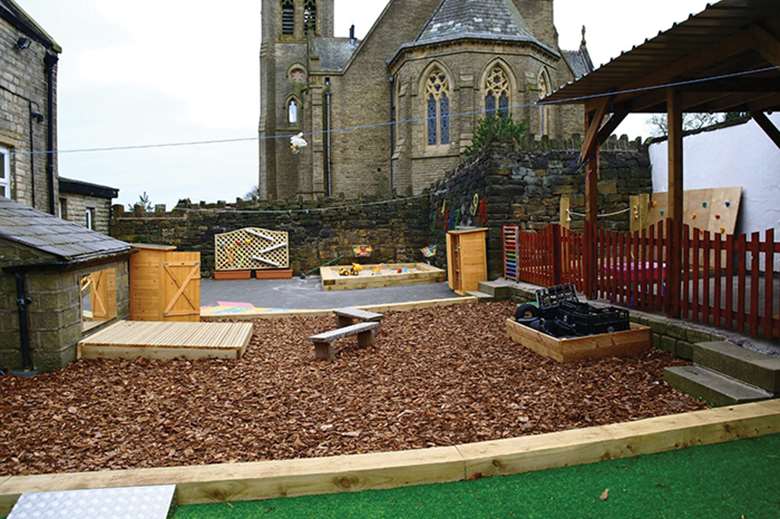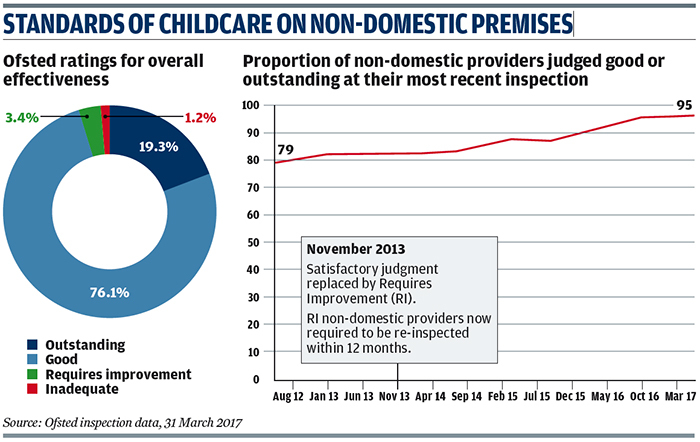Inspections: PVI childcare providers
Jo Stephenson
Tuesday, September 26, 2017
A change in inspection procedures has helped contribute to a rise in the proportion of childcare providers on non-domestic premises that are rated good or outstanding, latest Ofsted figures show.

The vast majority of childcare available to families comes under the category defined by Ofsted as "childcare on non-domestic premises".
Essentially this means private and voluntary sector childcare as opposed to childminders or childcare provided by schools.
The category includes nurseries, pre-schools, holiday clubs and other provision on business premises, generally registered on the Early Years Register as it caters for children aged 0 to 5.
The latest childcare data from March shows childcare on non-domestic premises accounts for 80 per cent of all childcare places - an estimated total of about one million places, according to Ofsted.
As of 31 March, there were 27,000 providers in this category, which is up 100 since December last year.
The data from March shows the vast majority of providers on non-domestic premises - 95 per cent - were judged "good" or "outstanding". This compares with 93 per cent of all childcare providers on the Early Years Register and 92 per cent of childminders.
Ofsted's annual early years report for 2015/16 shows standards in private and voluntary settings - as reflected by inspection ratings - are broadly in line with early years provision in schools. However, the highest ratings among all types of childcare are to be found in standalone maintained nursery schools.
As of March, 76 per cent of childcare on non-domestic premises was judged good and 19 per cent was judged outstanding with about three per cent rated "requires improvement" and one per cent "inadequate".
Over time, the proportion of childcare in this category judged good or outstanding has steadily increased. However, part of this increase can be explained by a change in inspection policy.
Since November 2013, all childcare on non-domestic premises judged requires improvement must be re-inspected within 12 months.
"This means that non-domestic providers have had more opportunity to demonstrate improvement than they did previously," says Ofsted.

There have been ongoing concerns about the quality of childcare in deprived parts of the country. The Ofsted annual report shows the proportion of good or outstanding private and voluntary sector providers in deprived areas has remained high. In 2012, three quarters of providers in the most deprived areas were rated good or outstanding - compared with just 59 per cent of school-based childcare and 60 per cent of childminders.
In 2016, 94 per cent of private and voluntary providers in the most deprived areas were rated good or outstanding compared with 86 per cent of schools and 80 per cent of childminders.
From September, working parents in England are entitled to 30 hours of free childcare for three- and four-year-olds, up from the current 15 hours. There have been concerns that the government has not set aside enough money to pay for it and quality could suffer.
Meanwhile, an ongoing debate about the importance of qualifications continues to rage amid the publication of the government's early years strategy earlier this year, which has an ongoing focus on boosting qualification levels.
A programme to develop the graduate workforce in deprived areas is in the pipeline with a feasibility study set to report back in 2018.
The government also intends to consult on proposals to allow practitioners with early years professional or early years teacher status to lead reception and nursery classes in schools - something they cannot do at the moment.
However, there are fears this could strip expertise from the private and voluntary sector, which will struggle to match teaching salaries.
The private and voluntary sector does not have access to the same funding and resources as school-based childcare provision and has traditionally employed staff with lower level qualifications.
Nevertheless, the Ofsted annual report shows the proportion of private and voluntary sector providers employing at least one member of staff with early years professional or qualified teacher status has risen from 35 per cent in 2011 to 48 per cent in 2016.
By the end of August 2016, there were just under 255,000 staff working in childcare on non-domestic premises.
Of those, 58 per cent held Level 3 qualifications, seven per cent had a Level 4 or Level 5 qualification, while 10 per cent were qualified to Level 6 and above. Meanwhile, 12 per cent had no relevant early years qualifications.
While research shows better-qualified staff have better-quality interactions with children, a major study by the London School of Economics, University of Sussex and University College London, published in February this year, found the impact of having staff qualified to graduate level in a nursery had a minimal impact on children's achievement.
According to the National Day Nursery Association's latest survey of members, increasing staff wages and recruiting staff are the top two challenges reported by nurseries. It found an increasing number of nurseries report they may be driven to employ a younger, less-qualified workforce to control payroll costs.
Case Study: Oldham nursery adapts to children's needs
- ‘Outstanding' in all areas
- Saddleworth Stars
- December 2016
Saddleworth Stars in Oldham is a private day nursery rated outstanding across the board by Ofsted.
"All staff have an excellent knowledge of how to support children's learning," says the setting's latest Ofsted inspection report, published in December last year, which found children make excellent progress.
There are currently 129 children aged three months and up on the nursery roll.
One of the setting's key advantages is the fact it is a family-run nursery and there is a big emphasis on parental involvement, says manager Kim Ratcliffe, whose own daughter attends as does the owners' son.
Partnerships with parents are "extremely strong", says Ofsted, which flags up the fact both parents and staff are "heavily involved" in assessing standards of care in order to drive improvement.
"The staff complete very rigorous assessments of children's individual needs in order to support their learning," adds the report. "Parents are extremely involved in the assessment process and regularly share information about the skills children are developing at home."
The setting used the Tapestry online system to record and track children's progress, which helps them compile a detailed annual report for each child, together with evidence they have hit key learning goals.
Recent data shows 98 per cent of children in the setting's preschool room, from its summer 2017 cohort, are meeting key developmental milestones with 18 per cent exceeding expectations. The remaining two per cent have special educational needs.
The nursery also uses a "VIP planning" system that hones in on the interests of individual children each week. Meanwhile, its flexible approach means staff have the freedom to deploy "in the moment planning".
"Say a child is climbing a tree and pretending it is a rocket - other nurseries might observe that and put something in next week's planning whereas staff here will use their skills to do something there and then," says Ratcliffe, who believes this approach has helped close achievement gaps and boost progress.
Listening to children is central to the setting's ethos, she adds. Every term the nursery has a "children's committee meeting" when a group of children come into the office with the nursery owners and talk about activities they have enjoyed and things they would like more of.
At the last meeting children said they wanted more water-based activities, which led to a big water slide on the nursery field.
The setting encourages so-called risky play such as climbing trees to build children's skills and independence.
Preparing children for school is key and it has a good relationship with local primaries.
"We have a lot of feeder schools - about 10 - so we do a pen pal system and the teachers come in," says Ratcliffe. "We have those links right across the year so it is not just a case of doing it quickly in July.
"We attend lots of meetings with schools to see what they deem as ‘school ready' and ensure we're on the same path - it's not just reading and writing."
For example, as part of building children's independence, the nursery has "tissue stations" in all of its rooms where children can look in the mirror and learn to blow their noses.




